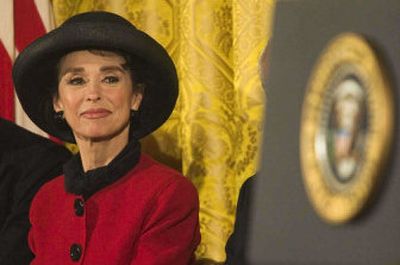Regal Rita

Hollywood filmmakers and television producers still create an artificial view of American life – “a Debbie Reynolds” world – says actress Rita Moreno, who has persevered through 60 years of entertainment-industry discrimination. Once a 5-year-old dancing in her mother’s New York ghetto apartment, Moreno quickly became a 13-year-old performing on Broadway. And she eventually won every major entertainment award – the Oscar, the Tony, the Emmy, the Grammy and the Golden Globe.
Next Tuesday she’ll be at the Spokane Convention Center to speak at the YWCA’s Women of Achievement Luncheon on two themes that have intertwined throughout her life — overcoming adversity and the importance of diversity. She advocates humor, discipline and sheer obstinancy.
“I’m stubborn, and I’m a person who just doesn’t give up,” she said in a telephone interview last week. “That’s immensely helpful when you’re faced with obstacles.”
Moreno immigrated to the U.S. from Puerto Rico with her mother when she was 5 years old. She loved dancing around her mother’s living room, and soon a friend recognized her talent and urged her mother to sign her up for dance classes. She performed on Broadway and in New York nightclubs before signing a movie contract.
For years she was cast in a string of forgettable, one-dimensional Latina roles. The stereotypes she played still have the power to make her swear with exasperation.
It wasn’t until after she won an Oscar for her acting in the film version of “West Side Story” in 1961 that her roles began to change.
One of her favorite films was Alan Alda’s “The Four Seasons” in which she played a New York designer married to an upper middle-class dentist.
“It just put me in the part of someone that wasn’t a little Latin firecracker,” she says.
Now Moreno, at 73, lives in Berkeley, where she’s created a career of cabaret singing, public speaking, regional theater and the occasional television or film role. Recently she appeared in a film called “King of the Corner” which had a limited distribution.
Now the discrimination in Hollywood takes a new form.
“In the final analysis I’m still the Latina actress,” she says “Now not only am I Latina, I’m also an older Latina actress, which makes it sort of a double whammy.”
If her reaction to that reality sounds like a Jerome Kern lyric, it fits – she loves American musical theater.
“That’s life,” she says. “What you can’t do is simply whine and weep about it. The old thing about picking yourself up and dusting yourself off is absolutely necessary.”
Few film roles exist for women in their 70s. Moreno points out that even actress Shirley MacLaine, who now appears in “In Her Shoes,” rarely makes movies anymore.
“And if it’s hard for her, you can imagine what it’s like for someone like myself,” Moreno says. “It’s just very, very difficult.”
The roles that do show up usually require being somebody’s mother or grandmother, and generally they boil down to wielding a coffee pot.
“It’s a coffee-pourer part,” Moreno says with a laugh. “I call it ‘pouring Café Bustelo.’ Bustelo is a very famous Hispanic coffee. If I could pour Maxwell House, maybe I could be an American mother sometime.”
She wants her audiences to realize that the United States is “not just a world of nice, white, middle-class Americans.”
“All of us are Americans,” she says. “One of the most touching things I saw during the Katrina tragedy was a black woman holding up a sign on the top of her roof saying, ‘I am an American.’
“Boy, that really just knocked my socks off. That said it all.”
Moreno and her husband live near two small grandsons she hesitates to leave right now.
Last year she played Maria Callas in Berkeley Repertory Theatre’s production of “Master Class,” directed by Moises Kaufman, who also directed “The Laramie Project.”
They plan to collaborate on a one-woman show on Broadway, an autobiographical piece similar to “Elaine Stritch at Liberty” in another couple of years, when her grandsons are old enough to visit her in New York.
In the meantime, she continues a strict routine of vocal warm-ups and Pilates, which keep her in shape and ready to perform.
“Persevere. Persevere. Persevere,” she says. “Don’t allow anyone to push you backward. Do not allow anyone to impede your vision of what it is you want out of your life.”
It sounds like she has plenty of life lessons to pass along.
“I do,” she says with laughter. “I’m not 73 for nothing.”